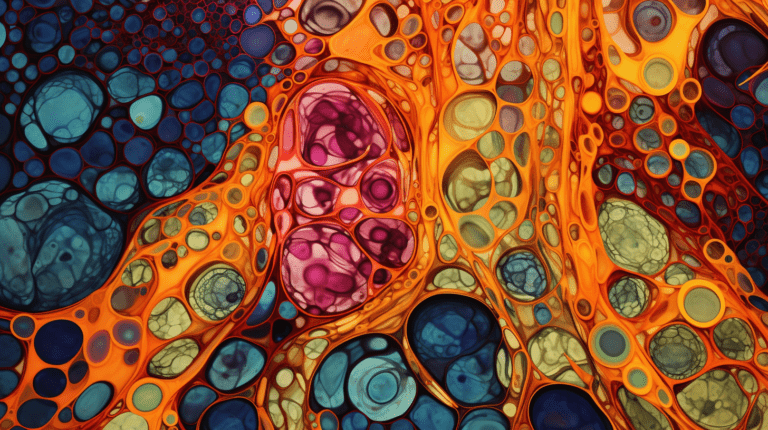Navigating the World of Spatial Biology
Unlock the Power of Spatial Biology to Revolutionize Cancer Treatment
Key Takeaways:
- Spatial biology is revolutionizing our understanding of cellular interactions, particularly within the tumor microenvironment.
- Cutting-edge techniques are paving the way for precision immuno-oncology, heralding a new era of personalized medicine.
- Challenges in translating research to clinical applications present exciting career opportunities for budding spatial biologists.
The world within a cell isn’t just biology, it’s geography. It’s easy to think of cells as standalone units, a collection of proteins, lipids, and other macromolecules that work in harmony. However, as researchers learn more about how cells function, they’re beginning to appreciate that where these cellular components are located – their “address” within a cell or tumor, is just as important as what they are.
Spatial biology, the fast-emerging frontier of bioscience, has taken this challenge by the reins, unveiling the intricate geography of cells, particularly within the tumor microenvironment. Using powerful imaging technologies like multiplex immunofluorescence, the field has redefined our understanding of the relationships between cancer cells, the immune system, and the supportive tissue known as stroma.
Here, we recap a recent webinar featuring two titans in the field: Brian Piening from Earle A. Chiles Research Institute, and Lubka Roumenina from Centre de Recherche des Cordeliers. Their webinar discussed the latest developments in spatial biology for immuno-oncology, including the technologies and methodologies used to study the tumor microenvironment, and the challenges in translating spatial biology to clinical work.
Spatial Biology vs. Traditional Immunohistochemistry
Traditional immunohistochemistry techniques have limitations when it comes to understanding the interactions between cellular and non-cellular components within the tumor microenvironment. On the other hand, the power of spatial biology lies in the ability to spatially map cell interactions within the tumor microenvironment and assess their significance. Spatial biology techniques allow researchers to identify important cell populations such as tumor-infiltrating lymphocytes (TILs) in the tumor microenvironment of cancer patients, characterizing their anatomical relationships and interactions with tumor cells.
Applications of Spatial Biology in Advancing Precision Immuno-oncology
Spatial biology can be applied to identify new and more effective immunotherapies by identifying spatially relevant biomarkers. Tumor mutational burden has been suggested as a potential biomarker for predicting response to immune checkpoint inhibitors. However, spatial biology is still in its early days, and scientists are still working to identify reliable spatial biomarkers. As scientists identify these spatially relevant biomarkers, they can use this information to determine which patients are most likely to respond to specific treatments. This could allow clinicians to offer more individualized treatments for cancer patients, leading to better patient outcomes.
Challenges in Translating Spatial Technologies to the Clinic
Challenges such as bioinformatics, reproducibility, data analysis, and access to cutting-edge technology hinder the translation of spatial biology to clinical work. Bioinformatics challenges include the development of computational methods to handle large data sets and integrate spatial information with genomic and transcriptomic data. Reproducibility challenges come from the variation in sample preparation, imaging modalities, and quantification methods. These challenges in integrating spatial technologies to the clinic make it difficult for researchers to develop and validate novel immunotherapies based on spatial biomarkers.
Conclusion
In summary, spatial biology is an important and emerging field that has the potential to revolutionize immuno-oncology. It provides a new level of detail about the spatial organization of cells in the tumor microenvironment that can guide the development of more effective immunotherapies. Furthermore, spatial biology biomarkers may enable clinical researchers to identify patients who will benefit most from immunotherapy. Although significant progress has been made in this field, it is essential to address the challenges faced in translating spatial technologies to the clinic to achieve personalized immunotherapy.
So, for those of you fresh out of school, passionate about biosciences, and eager to leave your mark on the work, spatial biology offers an excellent avenue. Consider checking out these relevant job postings at Greatness.bio, and help build the future, one cell at a time.
You can find the video here.
Speaker: Lubka Roumenina, Ph.D
Senior Scientist at Inserm
Dr. Roumenina is a senior scientist at Inserm, France, leading a group studying the innate immune complement system in physiology and pathology, with a focus on diseases affecting the kidney. She explores the mechanisms of activation and regulation of the complement cascade in the blood as well as the intracellular complement proteins. Dr. Roumenina is among the pioneers exploring complement in renal cancer, discovering the pro-tumoral role of the plasma complement cascade and the newly discovered intracellular complement proteins.

Speaker: Brian Piening, Ph.D
Technical Director for clinical Genomics at Providence Cancer Institute
Dr. Piening serves as technical director for clinical genomics at Providence Cancer Institute where he and the team utilize comprehensive genomic profiling to develop personalized treatment plans for patients with advanced cancer. He also runs a research laboratory at the Earle A. Chiles Research Institute at Providence that utilizes integrative multi-omics approaches to develop new methods for predicting which therapies will succeed or fail based upon a patient’s unique molecular tumor profile. Dr. Piening performed his doctoral training in molecular and cellular biology at the University of Washington and Fred Hutchinson Cancer Research Center and his postdoctoral training in genetics at Stanford University.

